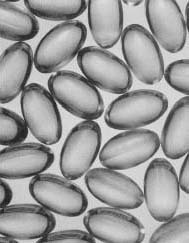Vitamin E
Vitamin E was discovered in 1922 by Herbert M. Evans and K. S. Bishop. The researchers found that laboratory rats failed to reproduce when lard was their only source of food fat. According to the researchers, there was a compound in both wheat germ and lettuce that corrected the problem.

For a time, the unknown component was termed the "anti-sterility factor." In 1925 Evans decided that the component should be renamed vitamin E since the last vitamin to be discovered was vitamin D.
The new vitamin was fat-soluble. Studies by Evans and his coworker Gladys A. Emerson (1903-) showed that vitamin E deficiency caused two different problems. It caused reproductive problems in both sexes of small laboratory animals. It also caused a muscle dystrophy in many species of animals. But for almost three decades, investigators were not certain whether vitamin E had any effect on humans.
Vitamin E Isolated
Evans and Emerson isolated vitamin E from wheat germ oil, corn oil, and cotton seed oil in 1936. In 1938 it was synthesized by Paul Karrer (1889-1971) and his co-workers. The investigators decided the vitamin's biochemical function was primarily a protective one. Its purpose is to help prevent unsaturated fatty acids from combining with oxygen. When the acids and oxygen do combine, tissues break down. Other antioxidants include vitamin C and the trace element selenium.
At first, vitamin E was believed to regulate tissue-damaging oxidation almost entirely in animals. But nutritional surveys in the 1940s and 1950s revealed otherwise. Premature infants and patients with malabsorption illnesses were found to have low levels of blood tocopherol. Those same surveys also showed they had other blood irregularities as well. In 1968, vitamin E was finally recognized as an essential nutrient for humans.
Other Functions of the Vitamin
Vitamin E is believed to help maintain the structure of muscle tissue and various components of the reproductive system, vascular system, and nervous system. Even with this knowledge, there may be other functions the vitamin performs that researchers are not aware of. There is little evidence to suggest, however, that vitamin E supplements can help repair existing damage.
[See also Vitamin ]